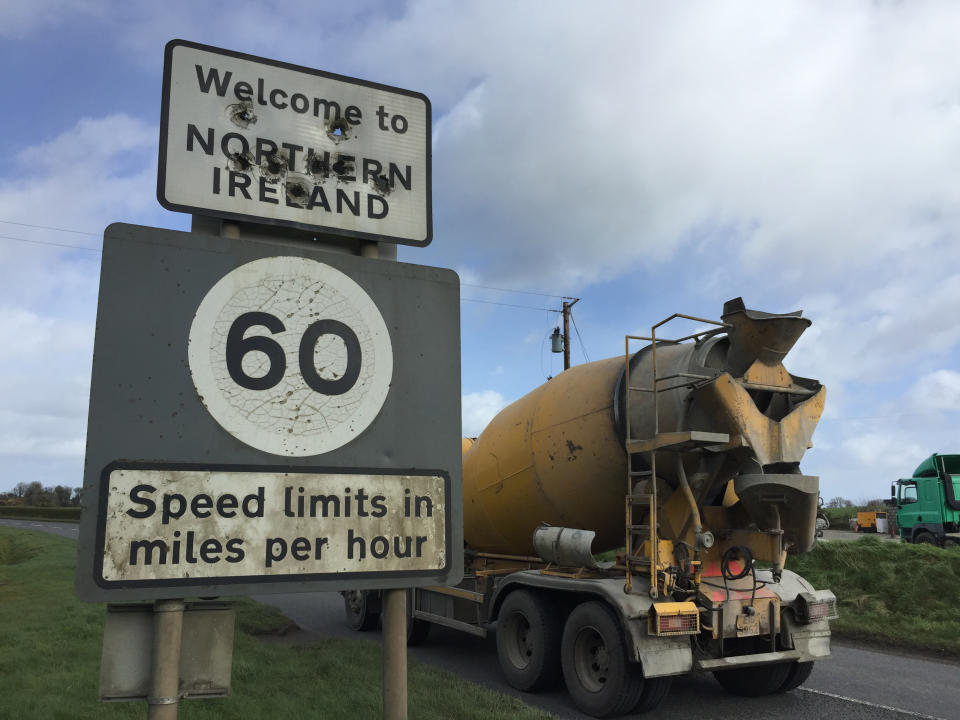No immediate Northern Ireland border checks from UK in no-deal Brexit

The UK government said on Wednesday that it does not plan on introducing checks or controls on goods moving across the land border into Northern Ireland in the event of a no-deal Brexit.
Goods that remain in Northern Ireland will not be subject to tariffs unless they are transported to the UK.
However, to prevent a “border in the Irish Sea,” goods moving between Northern Ireland and the rest of the UK will not be checked. Tariffs will instead be applied using compliance and intelligence methods.
The details of the unilateral plan — which is intended to be temporary — were published in a document on the same day that it was revealed that the UK will temporarily slash tariffs on some 87% of total imports in a no-deal scenario.
READ MORE: UK government publishes temporary tariff regime for no-deal Brexit
The government, the document says, “recognises that Northern Ireland’s businesses and farmers will have concerns” about its approach to the border.
“However these are the only steps the UK government can unilaterally take to deliver on our absolute commitment to avoid a hard border in the event of no deal.”
The plan will see it will introduce only measures that are “strictly necessary” to see the UK comply with international legal obligations, to protect the biosecurity of the island of Ireland, and “to avoid the highest risks to Northern Ireland businesses.”
These measures “will not require checks at the land border,” the document says.
To “prevent unfair treatment” of Northern Ireland businesses, goods arriving from Ireland would still be subject to the same VAT and excise duties as they are now.
READ MORE: What is the Irish backstop, what is it for and why is it controversial?
But the small businesses that trade across the border and are not currently VAT-registered will be able to file returns “periodically” and “without any new processes at the border.”
Animals and animal products coming from outside the EU would need to enter Northern Ireland “through a dedicated entry point,” while certain types of plant materials will require certification and advanced notification.
Because this regime is intended to be temporary, the government said that its priority would be to jointly agree with both Ireland and the European Commission on longer-term measures to avoid a hard border.
“The government has been clear that a deal with the European Union is the best outcome for Northern Ireland,” Northern Ireland secretary Karen Bradley said in a statement.
“But we will do all we can to support people and businesses across Northern Ireland in the event that we leave without a deal,” she said.
“The measures announced today recognise the unique circumstances of Northern Ireland. These arrangements can only be temporary and short-term.”
READ MORE: The 11 possible outcomes Britain faces post-Brexit deal rejection
The document was released even as the backstop in prime minister Theresa May’s Brexit deal — which also aims to recognise the unique circumstances of Northern Ireland — continues to be a key sticking point.
Despite receiving new legally binding assurances from the European Union that the backstop is only intended to be temporary, the deal was defeated by a huge margin in the House of Commons on Tuesday.
A swathe of Conservatives and Northern Ireland’s Democratic Unionist Party, which props up May’s government, fear that either Northern Ireland could be treated different differently from the rest of the UK or that the backstop might end up being permanent.
Ireland, the UK, and the European Union have all consistently committed to avoiding a hard border, and the backstop is intended to act as an iron-clad insurance policy that would ensure peace and stability on the island of Ireland continues.
In the 30 years prior to the signing of the 1998 Good Friday Agreement, clashes between loyalists and republicans — known simply as the Troubles — took the lives of around 3,600 people.
The Irish government, for its part, has continually said that it has no plans for the erection of border infrastructure in any Brexit scenario.

 Yahoo Finance
Yahoo Finance 
